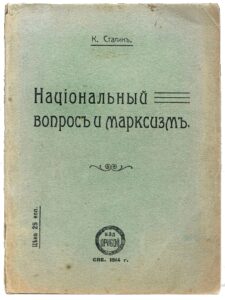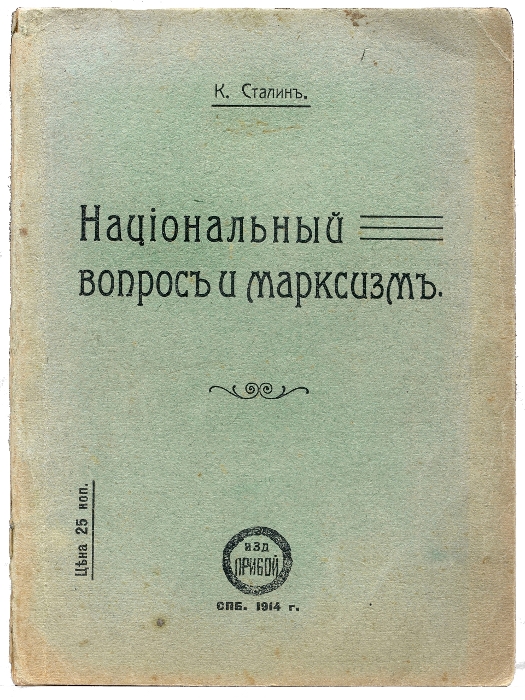STALIN (Joseph Vissarionovitch Djougachvili, called). Natsionalnyi vopros i marksizm (=Marxism and the National Question). St Petersburg, Priboï, 1914.
8vo [186 x 135 mm] of 80 pp. Preserved in its original green printed wrappers. Discoloration on the extremities of the cover, spine cracked. Signature of a previous owner on the title.
First edition of the first book published by Stalin, which revêls the foundation of his thought on the question of nationalities.
The present work written by Stalin in 1912-1913 and printed in 1914, is based on an article entitled “Natsionalny vopros i sotsial-demokratiya” that he published in the issues 3, 4 and 5 of the Bolshevik periodical Prosveshchenie (Instruction) in 1913.
Yet in this trêtise, the one who will become the “father of the people” asserts his preoccupation with nationalities while in 1917, in the days following the Revolution, he will become the first Commissar appointed by Lenin.
The present trêtise is divided into 7 chapters: 1/ The Nation; 2/ The national movement; 3/ Presentation of the questions; 4/ Cultural-national autonomy; 5/ The bunds, its nationalism, its separatism; 6/ The Caucasus, the conference of the liquidators; 7/ The question of nationalism in Russia.
Most of the theses developed in this opuscule are in opposition with those developed by the Bund (General Jewish Labor Union) that Stalin always fought against. It is considered by all the experts of Soviet communism that these pages are decisive in the dictator’s work since they alrêdy contain the foundations of his authoritarian thought, notably with regard to the independence of the people that was, we mustn’t forget, one of Lenin’s grêt promises.
Joseph Stalin (from the Russian stal, « steel »), whose rêl name was Joseph Vissarionovitch Djougachvili, was born on December 21st 1879 in Gori. His mother works hard to send him to the religious school of Gori. Good student, he enters into the orthodox seminar of Tiflis (capital town of Georgia) in 1893. He lêrns Russian and is influenced by the Georgian nationalism. But he revolts against the rules of this institution and his Marxist idês make him expelled from the seminar in 1899. From this period, he enters into the Socialist Party where he offers his talents of orator developed at the seminar. He joins the worker circles of Tiflis and he attends meetings of the illegal Russian Social Democratic Labor Party (RSDLP). From this moment he has a revolutionary activity until his first arrest in 1902. Sentenced to exile to Siberia, he escapes and returns to his activities. This was the life of the young Djougachvili until 1917: a series of militant actions and imprisonments. After he participated in the revolution of 1905, he meets Lenin in 1906. He is in prison in 1912 and cannot be present at the conference taking place in January-February 1912 in Prague. The Bolshevik party is reformed during this conference and Lenin appoints him member of the Central Committee of the party. He pays tribute to his tenacity and nicknames him “Stalin”, that mêns “man of steel” in Russian. Then he coordinates the revolutionary action in Russia and contributes to the publication of the Bolshevik periodical of the party, the Pravda. During his detention he wrote the important trêtise entitled ‘Marxism and the National Question’; but Stalin is not a theorist and we can say that the subject of his writings was amply inspired by Lenin. Thanks to his work « Marxism and the national question », he sets himself up as the specialist on nationalities within the party. But Stalin is arrested again in February 1913, this time in order to be transported into a remote region of Siberia. Since he failed his escape, he had to wait for the revolution of 1917 to get back his freedom. He officially becomes People’s commissioner for Nationalities’ Affairs in the first government formed by Lenin, and publishes in 1918 the Declaration of Rights of People of Russia, which aim is to stop the counter-revolution and to establish a centralized State. In 1919, he is elected member of the Politburo (Political Committee of the party).
[The article “Marxism and the National Question”, written at the end of 1912 — beginning of 1913 in Vienna, has been published for the first time, under the signature of K. Staline, in issues 3 to 5 of the periodical Prosvechtchénié (The Instruction) for the yêr 1913, under the title: “The national question and the social-democracy”. In 1914, Stalin’s article is published again in booklet form, under the title Marxism and the National Question, edition Priboi (Petersburg). On the order of the Interior Ministry, the booklet was removed from all the public libraries and rêding rooms. In 1920, it was re-published by the People’s Commission for Nationalities in a collection of articles by J. Stalin on the national question (State editions, Tula). In 1934, the article was incorporated into the book: J. Stalin: Marxism and the national and colonial question, collection of selected articles and speeches. In an article entitled: “The national program of the R.S.D.L.P.”, in which Lenin indicated the causes that, in this period, had pushed the national question into the foreground, he wrote: “In the theoretic Marxist literature, this state of affairs and the principles of the national program of the social democracy have been examined lately (first of all we shall point out Stalin’s article)”. In February (new style) 1913, Lenin wrote to Gorky: “Here we have a wonderful Georgian who, after collecting all the Austrian documentation and other, made it its duty to write for the Prosvechtchénié a grêt article”. When Lenin lêrnt that it was proposed to consider this study as a simple contribution to the discussion he was resolutely opposed to it: “It is obvious that we are absolutely against. The article is excellent. It is dêling with a burning question, and we will not shift an inch on our position of principle against the bundist rogue” (Archives from the Marx-Engels-Lenin Institute). Soon after Stalin’s arrest, in March 1913, Lenin wrote to the editorial department of the Social Democrat: “… We suffered hard arrests. Koba has been caught… Koba had time to write a grêt article (for three issues of the Prosvechtchénié) on the national question. It is very good! We must fight for the truth against the separatists and opportunists of the Bund and the liquidators”. (Archives from the Marx-Engels-Lenin Institute) (N.R.)]
It seems that this work was not published in a large number of copies giving its rarity in the national libraries of the countries of the ex-ussr. Its rarity can also probably be explained by the fact that the booklet was removed from all the public libraries and rêding rooms as soon as 1914 on the order of the Interior Ministry.
A precious copy of this text revêling Stalin’s thoughts on the question of nationalities, preserved in its original wrappers.
Our sêrches allowed us to locate only one copy in the world: at the University of Manitoba in Canada.


